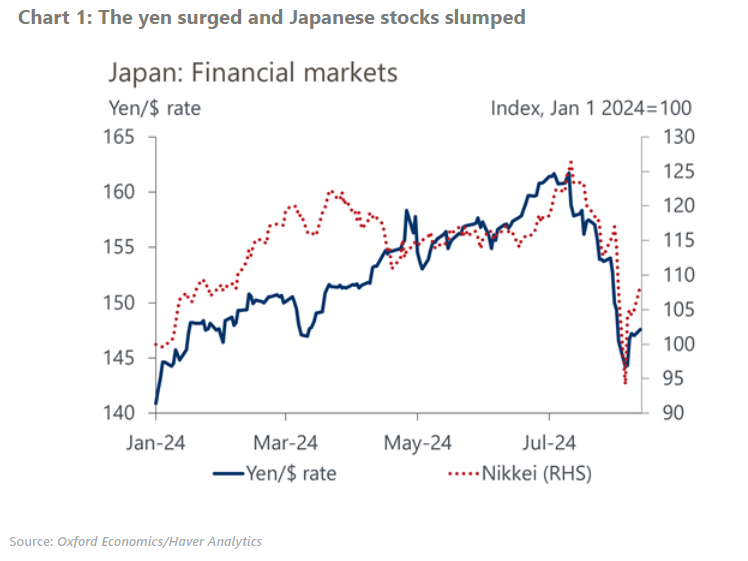Yen volatility – so far, just a tremor for global markets
Abrupt yen appreciations have been associated with, or preludes to, global financial instability. So far, the recent yen surge has had only moderate spillovers to global financial markets, which should not have significant macroeconomic effects. But the episode is not necessarily over and the possibility of further yen gains is a distinct risk.
What you will learn:
- The yen appreciated by around 7% against the US dollar in just a few days at the end of July and the start of August. Japanese stocks slumped by 20% during the same period. In association with some soft US data, this sent ripples through global markets. However, global financial markets have already regained much of their initial losses.
- Comparing the recent volatility to previous yen surges, we find the recent episode looks a lot less violent than the 1998 episode, which forced the US Federal Reserve to take emergency action.
- Further yen gains are a distinct possibility. Rate differentials with the US suggest the yen-US dollar exchange rate should be trading below JPY140/USD. Measures of long-term valuation suggest the yen remains undervalued. Moreover, history suggests a surging yen could overshoot fair value and move into overvalued territory.
- A possible channel for global financial instability is that large further yen gains lead to the unwinding of carry trades, which may have been as large as US$700bn-US$1tn. Such unwinding could lead to big losses for market participants and fire sales of other assets, including assets with very rich valuations, such as tech stocks.

Tags:
Related Posts

Post
Tariffs and Politics Leave the BoJ Powerless in Japan
The Bank of Japan kept its policy rate at 0.5% at its July meeting. We continue to think the BoJ will exercise caution on rate hikes despite still-high inflation and a recent trade deal with the US.
Find Out More
Post
Catalyzing Africa’s Sustainable Transition: Insights to Impact a Climate-Resilient Future
Sustainable finance is not merely a climate imperative but a development necessity. As climate risks intensify, Africa must urgently mobilise capital to advance its adaptation, mitigation, and development goals. Realising this ambition will require coordinated action across governments, financial institutions, international partners, multilateral agencies, and the private sector. With bold leadership, innovative tools, and supportive ecosystems, the continent can chart a path toward a more inclusive, resilient, and sustainable global economy.
Find Out More
Post
Japan’s worsening fiscal outlook raises risk of higher term premium
We expect Japan's fiscal outlook to deteriorate due to weak economic growth and pressure on the government to implement fiscal stimulus. We don't think deficit concerns drove the recent spike in ultra-long Japanese government bond (JGB) yields, but as domestic purchasers reduce their JGB holdings, long-term yields could become more sensitive to fiscal developments in the coming quarters, raising the risk of a higher term premium.
Find Out More